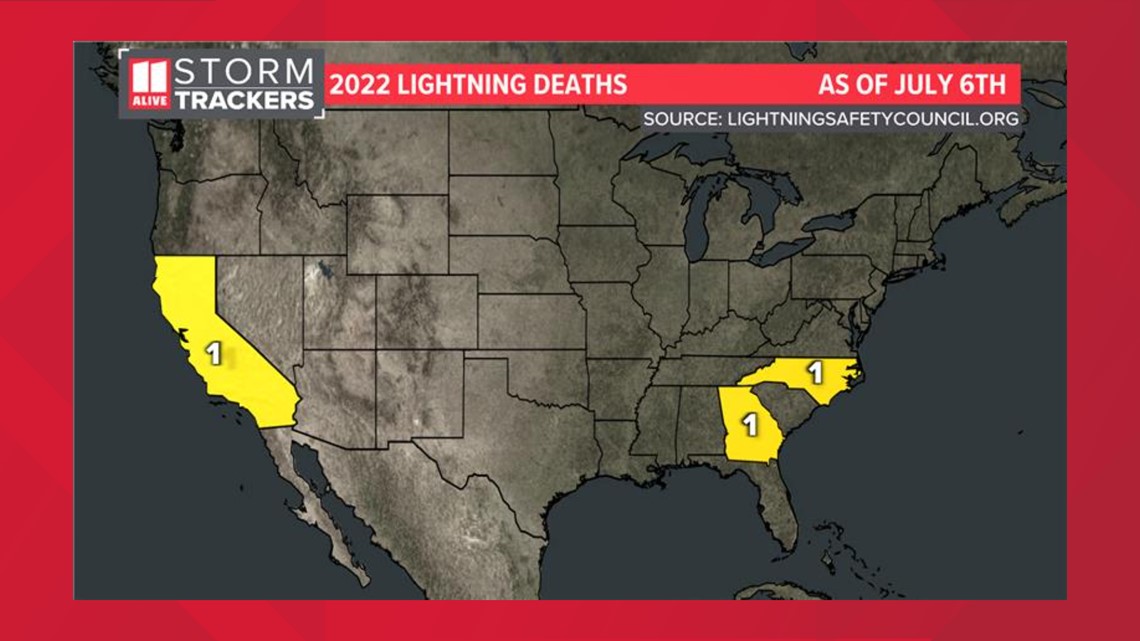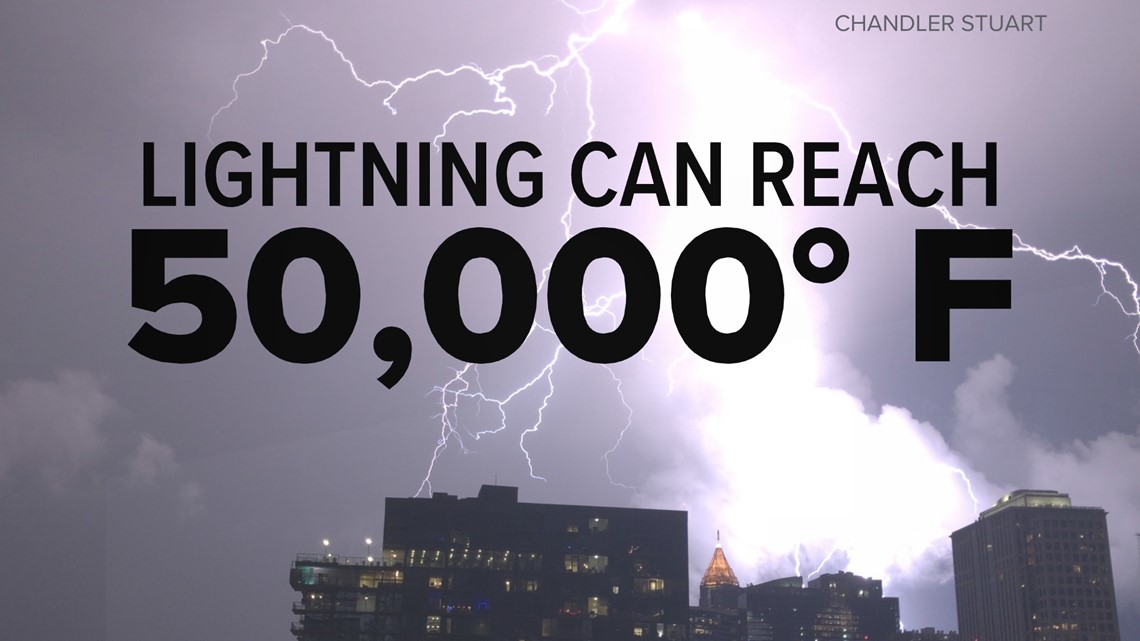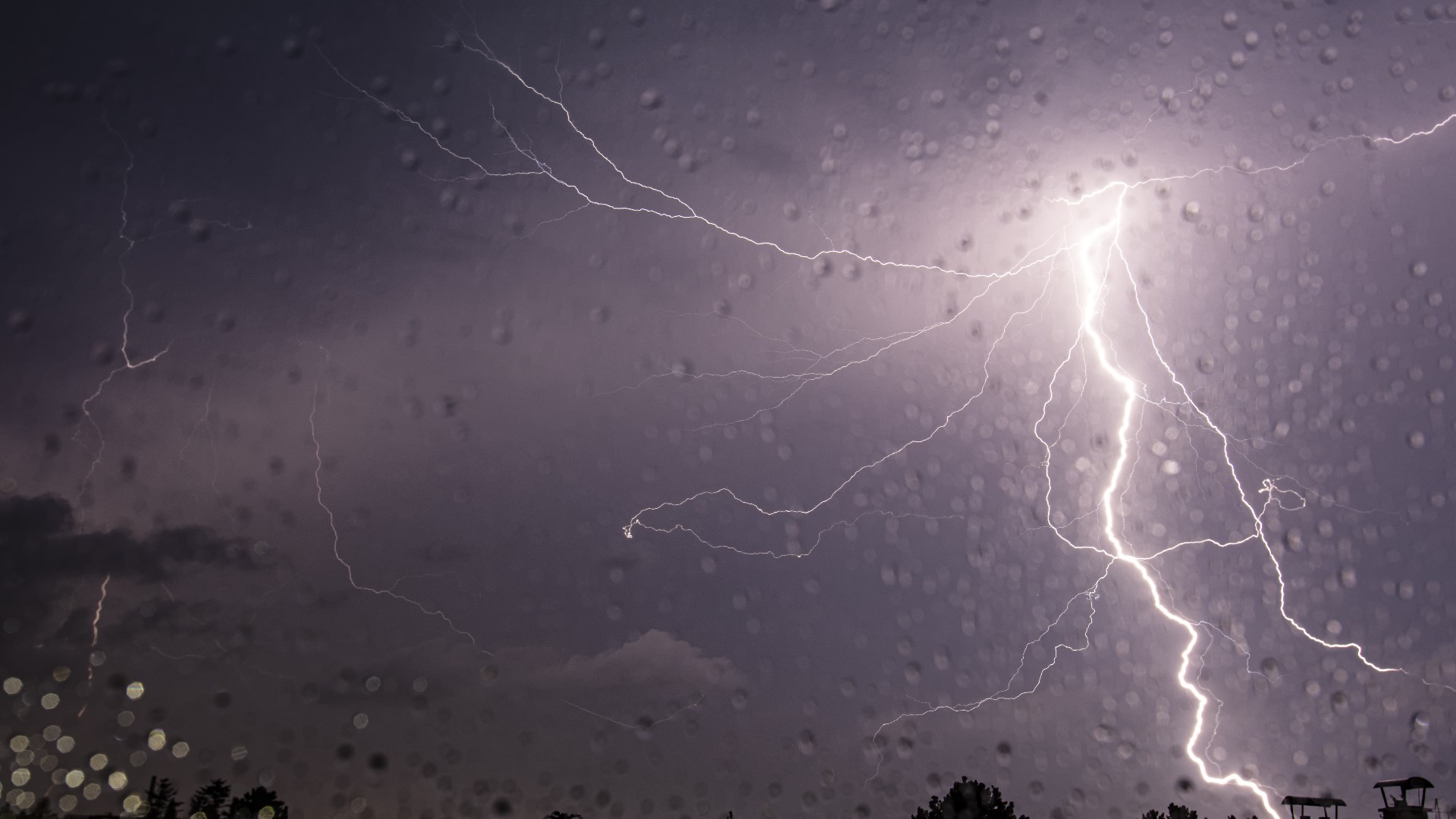ATLANTA — A 39-year-old man died over the weekend when he was struck by lightning while loading tools in his van.
It happened Saturday near a mountain top in Mountain City, in Rabun County, according to the National Lightning Safety Council.
The organization has reported three US lightning fatalities in 2022 so far - including the one in Georgia.
Though being struck is rare, according to Dr. Mary Ann Cooper, a direct strike is not the only way someone can be injured by lightning, and the repercussions for those who live can be lifelong.
Cooper, who is an emergency physician and lightning injuries and lightning injury prevention expert, told 11Alive about the dangers of lightning and the ways people can protect themselves.
"There's lots of other ways to be injured," Dr. Cooper said. "We tell people not to stand close to trees because lightning hits the tree -- it comes down and a portion jumps across to the person as a side flash or side splash.
Odds of being struck by lightning
When looking at the odds of becoming a lightning strike victim in the U.S., they are incredibly low. According to the safety council, people in the U.S. have a 1-in-1,443,000 chance of being a lightning victim in a given year.
The organization's first reminder and chief safety tip is to follow their "When Thunder Roars, Go Indoors" campaign.
"If you take the lightning threat seriously and always get inside before lightning becomes a threat, your personal odds of being struck are near zero," the National Lightning Safety Council said.
In 2021 there were 11 lightning fatalities, the lowest number in nearly 10 years.
Georgia, however, is in the hot seat, or lightning zone; the organization ranks the Peach State as having one of the highest in lightning fatalities from 2011 to 2020.


"Being along the coast, you know, close to the Atlantic Ocean between the Gulf Coast and the Atlantic Coast, it has more lightning," Cooper explained, "just like Florida and Texas and some of the other cities around that area."
Copper added Georgia sees a longer season for lightning. She said from statistics gathered from the last decade, Georgia ranks number 10 out of the 50 states for the highest lightning-related injuries and deaths.
"The lightning doesn't follow our rulebook," Cooper said. "It hits wherever it pleases, and there are known risks for being outdoors."
Lightning victims and medical recovery
Those who survive lightning strikes first have to deal with any injuries to their brain and nerves, then face the lasting effects, including irritability and personality change. Many often suffer from cardiac arrest at the same time that they are struck.
According to the National Lightning Safety Council, a person has to heal their nervous system after being struck. People will experience headaches, nausea, stomach upset, balance problems and other post-concussion symptoms for a few days.
Some (but not all) survivors also experience problems recalling old information or learning new things, multitasking and chronic pain from their nerve injury. Other symptoms could also include having a slower reaction time, forgetfulness, difficulty or excessive sleeping.
Lightning strike medical symptoms | Full list from the National Lightning Safety Council
Other delayed symptoms include:
- Personality changes/self-isolation
- Irritability and embarrassment because they can't remember people, job responsibilities and key information
- Difficulty carrying on a conversation
- Depression
- Chronic pain and headaches
Information for survivors
If you're a survivor of a lightning strike or electric shock, there's a support group available, formed in 1989 by a lightning survivor. Lightning Strike and Electric Shock Survivors International (LSESSI), according to the safety council's website, has helped "hundreds of survivors, families, physicians and others.


Lightning safety tips
No place is safe outdoors during a thunderstorm; according to the organization, when thunder is heard, people should funnel inside.
"If you hear thunder, that means lightning is close enough to strike you," it said.
Once inside, people should stay sheltered until no thunder is heard for 30 minutes.
The organization gave these tips for indoor safety and outdoor risk reduction tips if you're caught outside and unable to seek shelter:
Indoor tips
- Stay off anything that puts you in direct contact with electricity, like corded phones and computers.
- Avoid plumbing, including sinks, baths and faucets.
- Stay away from windows and doors and stay off porches.
- Do not lie on concrete floors, and do not lean against concrete walls.
Tips for outdoor risk reduction
- Immediately get off elevated areas such as hills, mountain ridges or peaks
- Never lie flat on the ground
- Never shelter under an isolated tree
- Never use a cliff or rocky overhang for shelter
- Immediately get out and away from ponds, lakes and other bodies of water
- Stay away from objects that conduct electricity (barbed wire fences, power lines, windmills, etc.)

